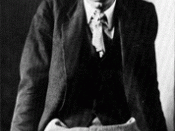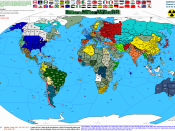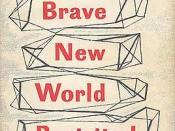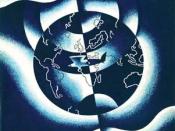Brave New World, Aldous Huxley Michael Howard Why do we read? That's as fair a question as any to extract from Huxley's famous 1932 novel, Brave New World. In this book, reading becomes a kind of mythical act of rebellion, a deed charged with subversiveness and anger. And Huxley is right -- that is how totalitarian societies of our century have regarded the choice to read freely. And why do those us in democratic societies read a book like Brave New World? Surely we have no need to worry about the alarmist issues Huxley raises. Right? Brave New World tells the story of Bernard Marx, a man who doesn't quite fit into a strictly controlled and pacified world. He is an Alpha, the highest caste in a society that stretches down to the semi-moron Epsilons, but he is still not content. He takes Lenina, a woman who firmly believes in the status quo, for a vacation in New Mexico, where they meet the Savage.
Marx brings back the Savage into polite society for his own reasons, and the last half of the book details the Savage's encounters with civilization. Huxley never lets up on the ruthless satire, and the ending of the book, in its unremitting bleakness, has seldom been matched (perhaps only by 1984 and The Sheep Look Up). A society modelled on Ford's assembly line has no room for the individual.
The Savage is a sympathetic character, and we often identify most with him when he lashes out in despair. For example, after his mother dies, in circumstances which further alienate him, he tries to interrupt the distribution of soma (a powerful drug with no physically harmful side-effects) to a group of Deltas (Chapter XV), vainly. Some of his choices near the end shift into the bizarre, and we get a disturbing glimpse into a mind collapsing into itself under unrelenting pressures. We begin by liking Marx, the man who brought the Savage into the corrosive forces of "civilization," but he too shows his true colours (his decision to bow to the World Controller's will). And perhaps he is only to be pitied in that his choices have been so thoroughly shaped by society, in the end, much the same way as Lenina. Lenina is the pawn of the Fordian society, and some of the satire to do with her sexuality didn't quite make sense (see next paragraph) and bothered me. Her behaviour is affected by her relationship with the Savage, but she has no way of seeing outside her perspective (ie, the perspective society assembled for her). Mustapha Mond is the Resident World Controller for Western Europe, and has read Shakespeare, just like the Savage. Bradbury uses much the same type of character in the Fire Chief in his Fahrenheit 451. I like how Mond argues -- sometimes on the Savage's level, and sometimes in the idiom of the society he oversees. For example, he exhorts the Savage at one point by saying: "'You can't play Electro-Magnetic Golf according to the rules of Centrifugal Bumble-puppy'" (194). Huxley manages to present some interesting, unique characters in a society that has set to eradicate such a thing in the name of happiness.
The levels of satire get very intense, and never let up. Huxley takes the metaphor of the assembly line to the extreme, with people making the sign of the "T" and saying, "Our Ford." As with Bradbury's Fahrenheit 451, the concrete reality of the book, while a compelling story, isn't the point. Bradbury was not predicting that people will burn books, rather that they will forget them. Huxley is worried about a state of mind, one that puts happiness into a materialistic paradigm. That human tendency is hardly news, but Huxley saw quite clearly how technology would change everything. A look around at our society shows no sign of World Controllers or soma in the literal sense, but the specific technologies of happiness are just as perturbing as Huxley's fictions. This overarching idea is well-justified and thought-provoking, but I was unsure of Huxley's point to do with sexuality, something that he tries to slot into the bigger theme. Is he condemning Lenina's actions as part of the false happiness created by this brave new world? Perhaps, but the opposite of what is presented in the book would be a return into the deepest, darkest Victorian era. If Huxley is indeed such a neo-Victorian, it's hard to believe he's the contemporary of people like Henry Miller or D. H. Lawrence. None of the above have a comforting view of women, and Miller and Huxley (if indeed he advocating the opposite of Lenina) are two sides of the same sexist coin. Is Huxley trying to make his false utopia somewhat attractive (to men, that is)? I didn't get that sense at all, and however smooth Mustapha Mond's presentation, Huxley situates his words so that they are obviously ridiculous. The centre of the spectrum between Mond and the Savage is a fine line that Huxley doesn't always find in his haste to let loose another vehement blast of satire. And Lenina remains the object of happiness or unhappiness.
In some ways, it's good that Brave New World is so extremely nasty and pointed. Huxley's career, long and varied, often gets boiled down to this one book, a book for which anyone would be proud to be remembered. This process of forgetting an author's body of work, while somewhat understandable, is frightening to contemplate -- Huxley is lucky to have something this good as the touchstone of his career.





